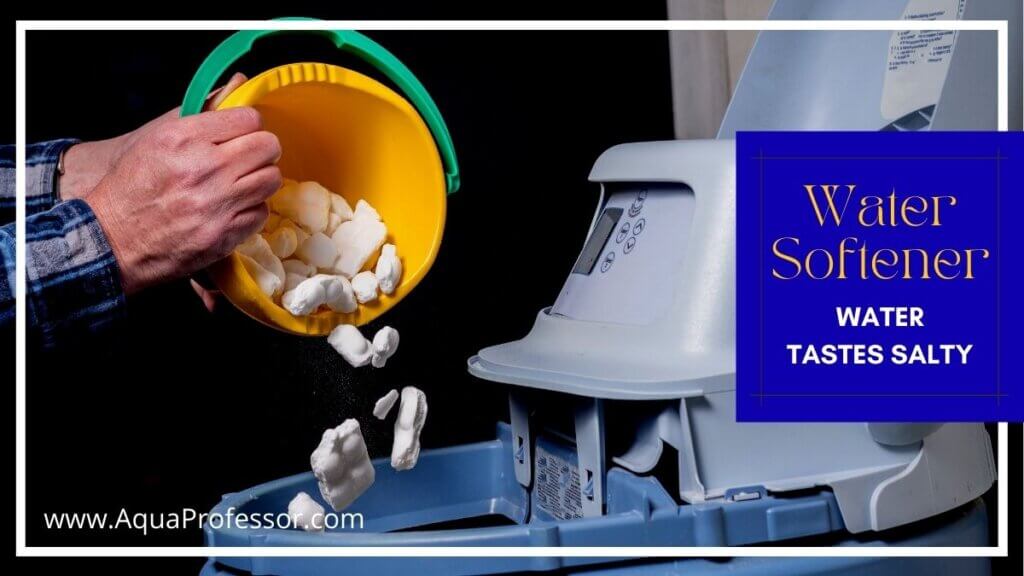
Did you start using a water softener, and now your water suddenly tastes salty? Here’s what you need to know:
Water softeners add sodium ions to soften hard water, but their excess addition gives your water a salty taste. Such softener malfunctioning can be due to:
The solutions include clearing up blockages, getting replacements for damaged parts, using a reverse osmosis drinking water system, etc.
Continue reading as I’ll expose 7 reasons why water softener water tastes salty, along with practical solutions for each.
Softened Water Tastes Salty [How To Fix]
| Reasons | How Complicated Is The Issue | Time Needed To Fix | Expertise Needed |
| Blockage In Injector Valve | 7/10 | 15-20 mins | 5/10 |
| Wrong Programming of Control Head | 8/10 | 20-40 mins | 7/10 |
| Blockage In Drain Line Flow Control | 7/10 | 15-20 mins | 6/10 |
| Clogging of Drain Line or Brine Line | 7/10 | 15-20 mins | 5/10 |
| Brine Cycle Interrupted | 6/10 | 20-40 mins | 8/10 |
| Excess Water In Brine Tank | 8/10 | 20-60 mins | 7/10 |
| Faulty Brine Valve | 8/10 | 20-60 mins | 7/10 |
| Water usage during regeneration | 4/10 | 10-15 mins | 3/10 |
Also Read: Are Water Softeners Worth The Price?
⚡ Blockage In Injector Valve
Water softeners have injector valves that contain numerous horizontal and vertical holes. These holes are prone to get clogged by dirt, solid impurities, sediments, etc.
If your injector valve is blocked, it may add excess salt content to your water, resulting in salty water.
What To Do?
To resolve this issue, you should remove all the blockages using a wooden stick. You can do it by yourself. No professional is needed.
Do not use metal equipment as it may harm the injector valve further by creating an even bigger hole. Injector valves are a delicate part of the softener, so handle them carefully.
The entire process might take 15-20 minutes on average (depending on the blockage).
If you’re unable to clear out the blockage, you may need to get the valve replaced. Once done, you will start getting tasty water again.
Also Read: Can You Melt Ice Using Water Softener Salt?
Wrong Programming of Control Head
Programming the control head is an integral part of using a water softener. You must ensure that correct information about your water hardness level is set into the control head. Wrong programming inputs can cause your water to acquire higher salt levels, giving it an unpleasant salty taste.
Settings may also be altered and affected by other factors, like power outages or mishandling by children or a noob. Whatever the reason, you must program the control head with utmost care.
Assess the settings on your water softener and reset any settings you find wrong or unsuitable for your household. Call for expert help if you face trouble handling the technical settings.
Also Read: 5 Ways To Remove Salt From Soft Water
Blockage In Drain Line Flow Control
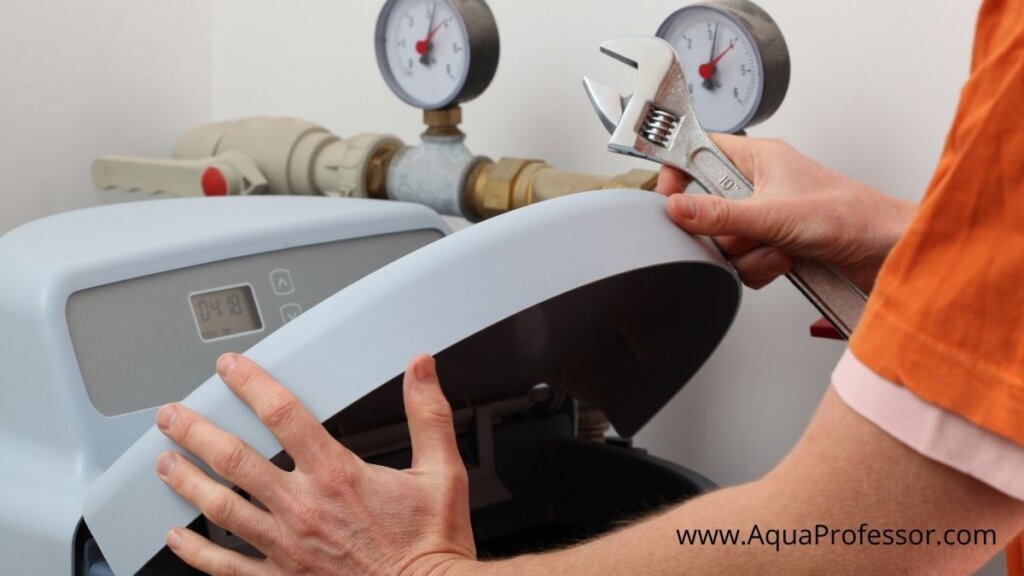
The drain line of your water softener is a common site for blockage. It could become crumpled or kinked over time, leading to improper water passage and collection of debris.
Paying attention to the length of your drain line is also essential. Too long drain lines (more than 8 feet) can cause inefficient water drainage.
To clear the drain line, follow it with your hands and keep taking out the collected debris. This may take 15-20 minutes, but it does not require special expertise.
A simple solution to a complex water issue, isn’t it?
Also Read: 3 Simple Ways To Reduce TDS In Drinking Water
Clogging of Drain Line or Brine Line
Excess sodium content in your brine solution may clog your drain or brine line, making your water unnaturally salty.
Another reason can be the crimping of the brine line leading to an uneven water flow and ultimately causing salty-tasting water.
The solution is simple:
Follow the steps mentioned above to clear out a blocked drain line. Take out the components and clear them. In case you find damage to some parts, you may need to get them replaced. Once resolved, you can start getting your healthy and tasty water again.
Brine Cycle Interrupted
The brine cycle is the routine exercise of clearing calcium and magnesium from a resin bed using a brine solution. This cycle helps keep the salt levels in your water in check.
If your brine cycle is interrupted, it may cause higher salt levels in your water.
To deal with this, ensure you don’t interrupt the regeneration process and that the cycle isn’t disturbed. Follow a proper routine to see the best results.
Also Read: 5 Eco-Friendly Ways To Discharge Softener Backwash!
Faulty Brine Valve
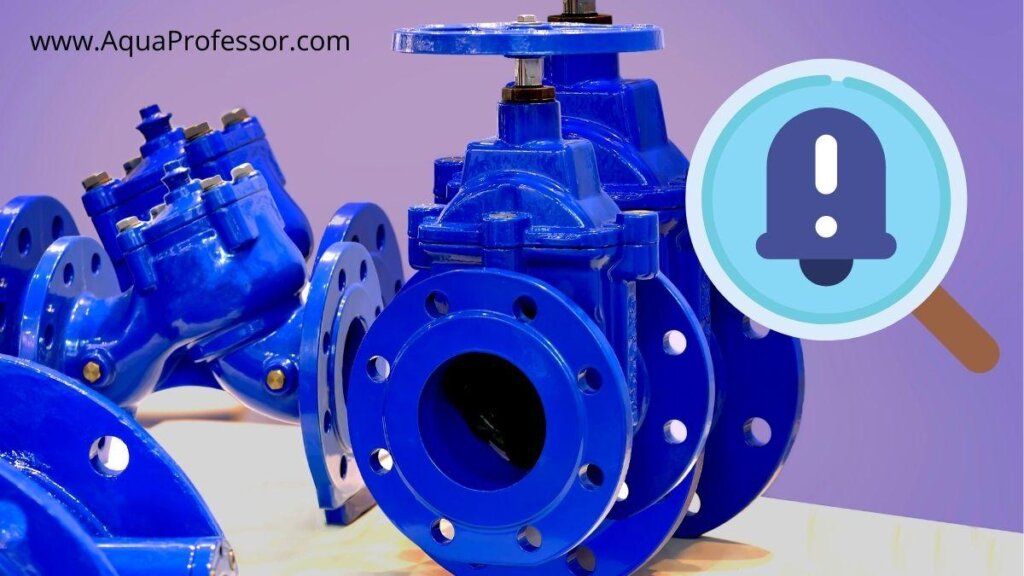
The brine valve has components like brine pistons, down flow pistons, and a spacer stack prone to damage. A faulty brine valve can cause leakage of brine solution into the resin container. This could lead to salt concentration in the resin bed, ultimately causing salty water.
To assess the situation, remove the drain and look for signs of leakage; if you find any, it is probably a faulty piston issue. Get a replacement for the said part, and you will be good to go.
Also Read: 6 Reasons Why Your Filtered Water Tastes Weird
Water Usage During Regeneration
Your softener is programmed to perform water regeneration during the night when it is unlikely the water will be used. If you’re using water during this period, you will likely consume salty water.
For instance, let’s say the water regenerates between 2-4 AM. If you wake up and get a glass of drinking water during this time, you will probably be consuming salty water. It could also be if your water is regenerated during the daytime.
This issue is easy to resolve: just open the taps and faucets and leave the water running until all the salty water is gone, and your water again tastes the way you always loved.
🤔 Does Water Softener Make Water Salty?
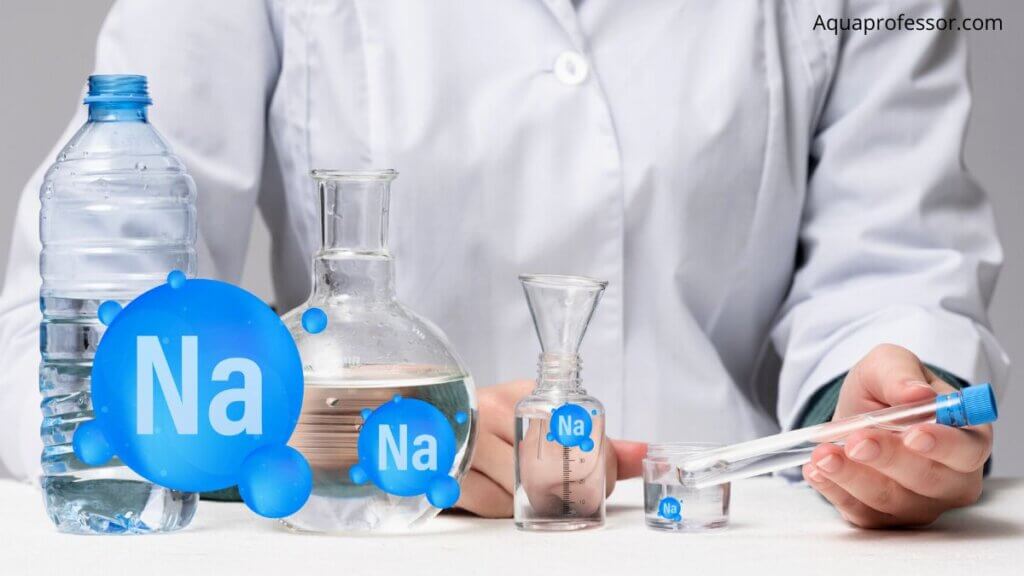
As mentioned earlier, the salty taste in water is due to the added sodium in it by the water softener. Now, the question arises: why softened water tastes salty? Why exactly is sodium added to water, and how much?
Here’s the truth:
Sodium is added to water to treat its hardness level. As you know, hard water contains strong ions like calcium and magnesium. These calcium and magnesium ions come in contact with the water when it travels through chalk and limestone deposits.
The higher the amount of calcium and magnesium, the higher the hardness level in your water. These mineral ions cause damage to the pipeline, affect the water quality, and may also give it a metallic taste.
The water softeners soften water by exchanging calcium and magnesium ions with soft sodium ions in the process known as water softening. The presence of these sodium ions makes the softener water taste salty.
The next question is how much sodium is added to water?
The amount of sodium added by a water softener depends on the hardness level of your water. It exchanges about equal amounts of sodium for hardness in the water. So, the more hardness your water has, the more sodium content it will receive.
There is a simple formula to calculate the amount of sodium in your water:
Grains per gallon of hardness in water * 2 = mg of sodium in an 8 oz glass.
So if your water has 10 grains per gallon of hardness, an 8-ounce glass of water will have about 20 mg of sodium.
But hard water may contain some amount of sodium in it already. To calculate how much sodium is being added to your water, you might need to get your water tested.
After that, you can do simple math to calculate how much sodium was added.
Also Read: 7 Reasons Why Is My Water Brown When I First Turn It On
⚙️How Does A Water Softener Work?
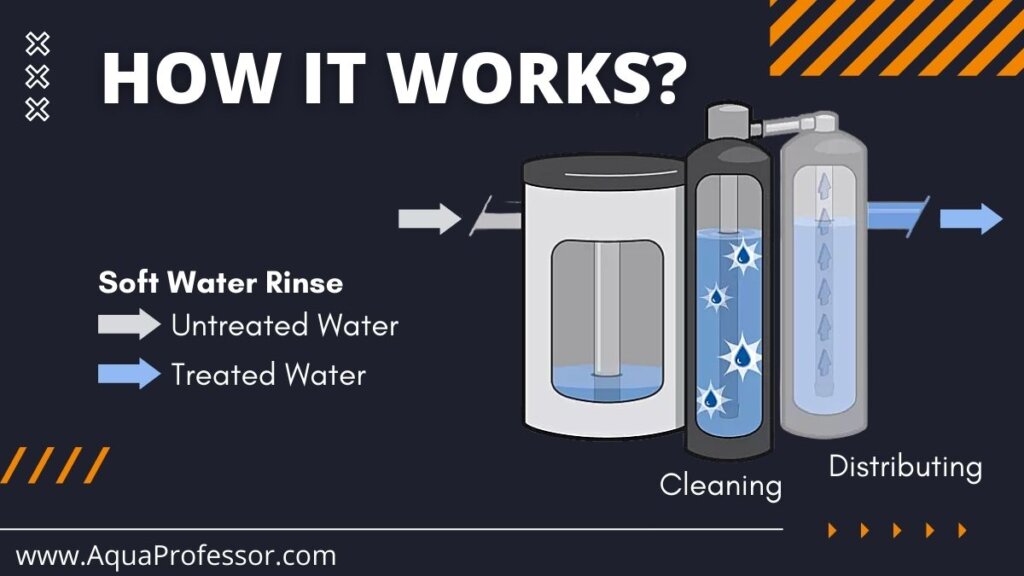
A water softener eliminates hardness from your water and makes it safe for consumption. A common misconception is that the salt in water softeners softens the hard water, while in reality, the resin beads present in softeners deserve the credit.
Thousands of resin beads in water softeners work by filtering out all the hard water contaminants.
Here’s how water softeners work:
Other great alternatives to the salty water problem include using reverse osmosis drinking water systems or adding potassium chloride instead of sodium to treat hard water.
Also Read: Pros And Cons Of Salt-Free Softeners
Water Softener Water Tastes Salty FAQs
Can low water pressure affect the working of a water softener?
Yes, water with low pressure may affect the functioning of the water softener and add excess salt content to your water, giving it an unpleasant salty water taste.
A water softener needs water at a pressure of 45-70 psi. Anything lower than that can alter the production of soft water.
Should soft water taste salty?
No, even though water softeners contain salt, they are not supposed to add abnormal salt content levels to your water. So softened water tasting salty may signify that there might be some issue with its functioning.
Can a water softener cause high blood pressure?
Yes, if the water softener is not functioning correctly and causing elevated sodium levels in the water, it may lead to high blood pressure.
What is the optimum level of sodium in drinking water?
According to the US Environmental Protection Agency, the recommended optimum sodium level in water is 30-60 mg/L.
How to make water taste better?
To make water taste better, ensure it is adequately filtered, free from impurities, and has optimum salt and mineral content levels. To enhance the softened water taste, you may add citrus slices to it or other flavor enhancements like mint.
Sayan understands that access to clean water doesn’t have to be costly.
He strives to provide knowledge of water purification techniques in the simplest way possible so that we can lead a healthy life without breaking our bank.

My water tank water has 3000 TDS level can it be generate to softer level?
Hey Yakub, TDS doesn’t tell about water hardness, I suggest you get your water checked for hardness.